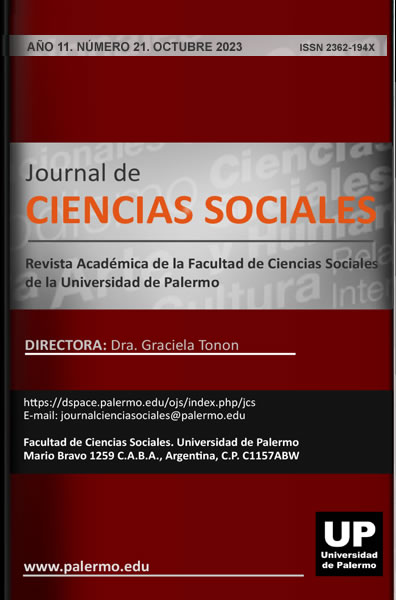“Riding a Juggernaut”
Notes about some social proposal´s in Giddens
Abstract
The objective of the following paper is a preliminary investigation of Giddens' ideas about the social, expressed in terms of modernity, basic trust, expert systems and risk policies, methodologically going through his main texts, contrasted in turn with others (from other disciplines) that allow a new approach to them. Giddens indicates the place of reflexivity and expert systems as structures that integrate the world, the social, daily experiences and the constitution of the self, and in that version of the social that is called modernity. All these factors come together in risk and opportunity, but framed in the achievement of a feeling of identity that feels like one's own and authentic. Based on these issues, this article aims to try to deepen what is meant by the social and, especially, what degree of reliability it may deserve, from Giddens' perspective, but also integrating other cultural, social and cultural perspectives. psychoanalytic, to try to situate the epistemological implications at stake, pointing out its scope and limitations. As results, it is indicated that it is possible to perceive a certain conception of the social fabric in terms of integration and predictability, but always according to a specific social context. In this way, Giddens's social ideas are open to criticism, but they are not unattainable as long as his sociological analysis does not avoid perplexities, confusions and difficulties, which indicate a social that escapes rational, functionalist and even structuralist dimensions.
Downloads
References
Ariès. Ph. y Duby. G. (1990a). La Comunidad. el Estado y la familia. Historia de la vida privada. vol. VI. Taurus.
Ariès. Ph. y Duby. G. (1990b). La revolución francesa y el asentamiento de la sociedad burguesa. Historia de la vida privada. Vol. VII. Taurus.
Aulagnier. P. (1975). La violencia de la interpretación. Del pictograma al enunciado. Amorrortu.
Aulagnier. P. (1994). Los destinos del placer: alienación. amor. pasión. Paidós.
Baudrillard. J. (1984). Las estrategias fatales. Anagrama.
Baudrillard. J. (2008). Cultura y simulacro. Kairós.
Baudrillard. J. (1988). El éxtasis de la comunicación. En H. Foster (Ed.), La Posmodernidad (pp. 187-198). Kairós.
Bauman. Z. (2007). Miedo líquido: la sociedad contemporánea y sus temores. Paidós.
Beck. U. (Comp.) (1997). Modernización reflexiva-política. tradición y estética en el orden social moderno. Alianza Universidad.
Beck. U. (2000). Libertad o capitalismo. Conversaciones con Johannes Willms. Paidós.
Bion. W. (1962). Learning from experience. Tavistock.
Castoriadis. C. (1992). A criação histórica. Artes e ofícios.
Castoriadis. C. (2004). Sujeto y verdad en el mundo histórico-social. Fondo de Cultura Económica.
Dolto. F. (1990). La causa de los adolescentes. Seix Barral.
Donzelot. J. (1998). La policía de las familias. Pre-Textos.
Erikson. E. (1965). Childhood and society. Hogarth Press.
Foucault. M. (1976). Vigilar y castigar. El nacimiento de la prisión. Editorial Siglo XXI.
Freud. S. (1931). El malestar en la cultura. Tomo XXI. Amorrortu.
Giddens. A. (1993). Consecuencias de la Modernidad. Alianza.
Giddens. A. (1995a). Modernidad e Identidad del Yo. El yo y la sociedad en la época contemporánea. Península.
Giddens. A. (1995b). La transformación de la intimidad. Sexualidad. amor y erotismo en las sociedades modernas. Cátedra.
Giddens. A. (1997). Vivir en una sociedad postradicional. En U. Beck, A. Giddens y S. Lash (Eds.), Modernización reflexiva. Política. tradición y estética en el orden social moderno (pp. 75-136). Alianza Universidad.
Habermas. J. (1988). La modernidad. un proyecto incompleto. En H. Foster (Ed.), La posmodernidad (pp. 19-36). Kairós.
Habermas. J. (1989). El discurso filosófico de la modernidad. Taurus.
Kaës. R. (1993). El grupo y el sujeto del grupo. Elementos para una teoría Psicoanalítica del Grupo. Amorrortu.
Klein. A. (2013). Subjetividad. Familias y Lazo social. Procesos psicosociales emergentes. Ediciones Manantial.
Kohut. H. (1982). Introspection. empathy and the semi-circle of mental health. The International Journal of Psychoanalysis, 63(4), 395–407.
Laplanche. J. y Pontalis. J. B. (1981). Diccionario de Psicoanálisis. Editorial Labor.
Lewkowicz. I. (2004). Pensar sin estado. La subjetividad en la era de la fluidez. Paidós.
Lipovetsky. G. (1990). El imperio de lo efímero. Anagrama.
Lipovetsky. G. (2000). La era del vacío. Ensayos sobre el individualismo contemporáneo. Anagrama.
Lyotard. J.-F. (1987). La condición postmoderna. Cátedra.
Merton, R. (1964). Teoría y estructuras sociales. Fondo de Cultura Económica.
Sader. E. y Gentili. P. (1999). La trama del neoliberalismo. Mercado. crisis y exclusión social. Editorial Universitaria de Buenos Aires.
Taylor, Ch. (2006). Fuentes del yo, la construcción de la identidad moderna. Paidós.
Vattimo. G. (1994). En torno a la posmodernidad. Anthropos.
Winnicott. D. (1972). Realidad y Juego. Gedisa.
The authors retain the rights to their work guaranteeing this journal the right of first publication, committing to cite the Journal of Social Sciences as a reference of the original publication.
The works published in the Journal are published under the terms indicated in the Creative Commons License with the International Attribution 4.0 (CC BY 4.0).




























